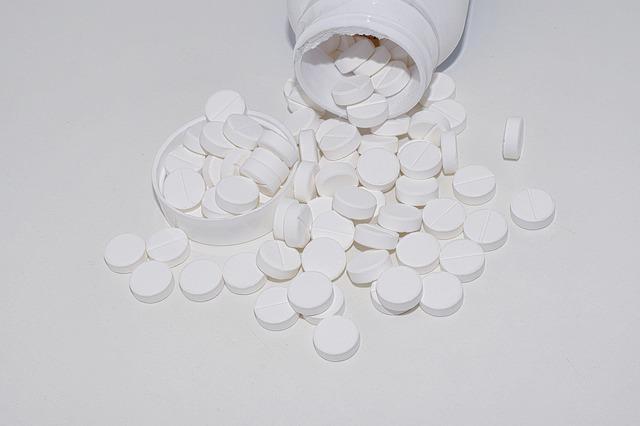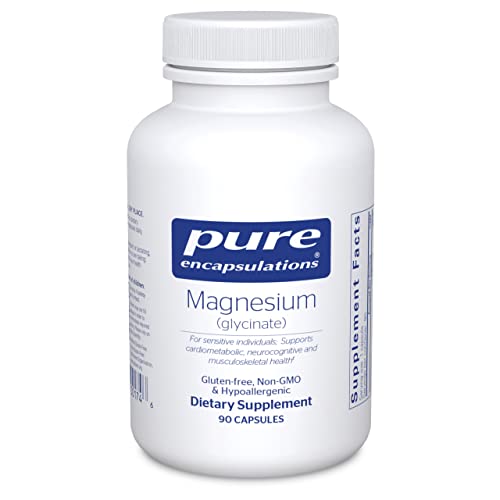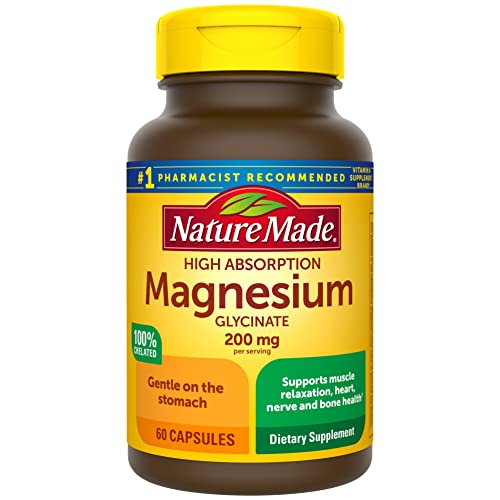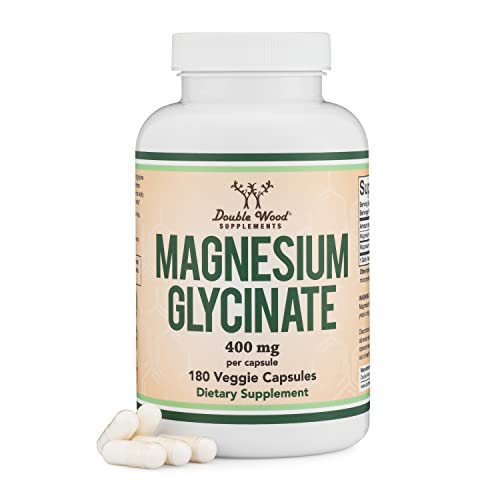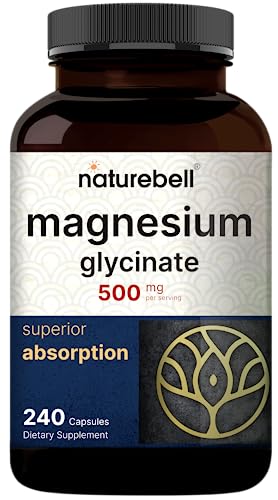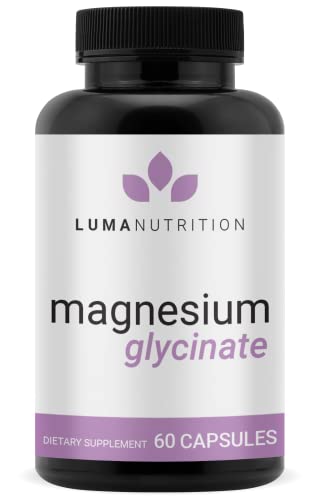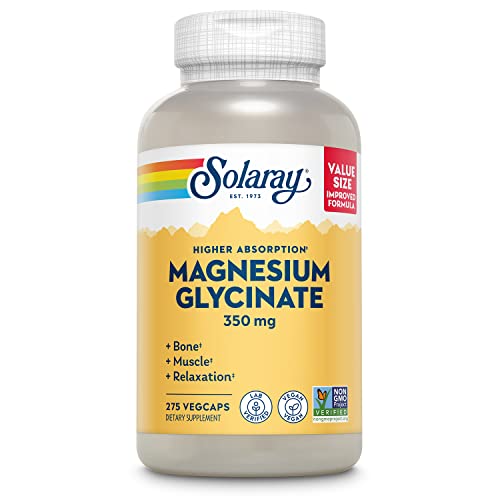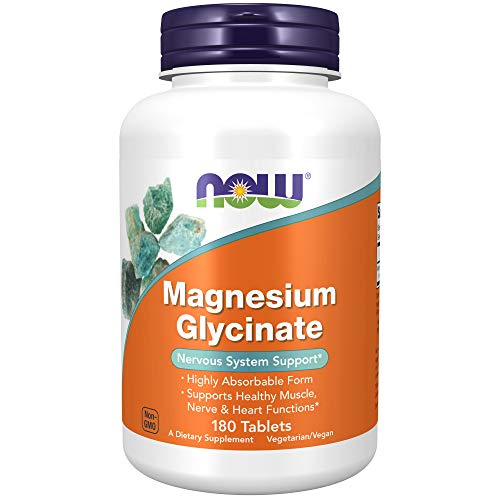Magnesium Glycinate: Benefits, Side Effects & more
If you are one of those who care about your health and always want to give the best to your body, then you have probably already heard that taking some magnesium glycinate benefits as a dietary supplement could help your health in many ways. Maybe you have an acquaintance who takes magnesium glycinate because he suffers from headaches or a relative who is a fan of the Epsom salts bath, or a coworker who swears by the magnesium powder they drink to recover from the aches and pains that occur after
physical training. Whatever the reason, magnesium glycinate is fast becoming one of the most popular supplements in the wellness world.
Magnesium Glycinate Benefits and your health
Why is it so popular? There are many different types of minerals, but few are as involved in our everyday health and well-being as magnesium. For starters, according to the NIH, magnesium plays a key role in more than 300 diverse biochemical reactions in the body. These reactions range from those involved in energy production and protein synthesis to blood sugar control and blood pressure regulation. In other words: magnesium is very important for our health.
And this brings us to good news and bad news. The bad news is that it is hypothesized that between 50 and 90 percent of us are deficient in magnesium due to factors such as the use of medications, soil depletion and the main deficiencies of the standard diet that is deficient in quality, in fact processed foods practically lack this important mineral. The good news is that, fortunately, magnesium supplements are cheap, generally safe and are available in many forms, such as Epsom salts, oil magnesium cream magnesium powder baking and capsules of supplements traditional, easy addition to your routine daily routine. Want more good news
What you need to know about magnesium glycinate: Uses of magnesium glycinate and magnesium dosages.
As mentioned above, magnesium comes in many different forms. Magnesium sulfate can be taken by injection or intravenously to treat a wide variety of conditions, including seizures in pregnant women with severe eclampsia, muscle spasms, brain swelling, and uncontrolled rapid heartbeat. The dosage for magnesium sulfate is different depending on the type of treatment, and magnesium sulfate can also be used in the form of Epsom salts, which you can add to your bath.
Another popular type of magnesium is transdermal magnesium, which includes magnesium chloride “oils” and creams. But does transdermal magnesium really work? There is a debate about this, and the science is not entirely clear. That said, transdermal magnesium cream has proven its effectiveness in increasing magnesium concentrations in blood and urine in a single-blind parallel study for non-athletes at a dose of 56 mg/day.
What is the dosage?
But what about the typical oral magnesium supplement in a capsule or powder? According to expert sources, supplemental oral magnesium, which includes forms such as magnesium citrate, magnesium glycinate, magnesium malate and magnesium oxide, is safe in the following doses:
- 65 mg for children aged 1 to 3 years
- 110 mg for children aged 4 to 8 years
- 350 mg for children over 8 years of age
- 350 mg per day in adults aged 19 years and over is recommended for men, women and pregnant and lactating women.
Dosage recommendations for magnesium may vary slightly with other sources, as the recommended dose for women is 320 mg and the recommended dose for men is 420 mg per day. Many also suggest that magnesium intake should be increased during pregnancy.
Benefits of magnesium glycinate:
Should you choose this form of magnesium over others? Magnesium glycinate is a favorite among doctors of integrative and functional medicine, it has been used in quite a few studies. According to these magnesium glycinate is one of the easiest types to be absorbed by your body, which makes it an excellent way to treat migraines and other headaches. Also act as quickly as possible. In addition, since it is one of the most bioavailable forms, it is an excellent option for those looking to help correct nutrient deficiencies.
Here are some of the main benefits of magnesium glycinate:
- Magnesium glycinate for insomnia.
Many people use magnesium as a sleep aid, and although the mechanisms are not entirely clear, its ability to induce muscle relaxation and relieve anxiety are two of the ways it is believed to help improve sleep. In a study on the elderly, magnesium glycinate supplementation subjectively improved insomnia. - Memory: Research has shown that magnesium glycinate can help decrease daytime sleepiness and improve memory. In one study, better performance in memory recognition tasks and less drowsiness during the day were shown by taking 3 grams of glycine a day.
- Improved memory
Improve memory with magnesium by restoring the low levels of magnesium that affect the functions of certain parts of the body. - For lower blood pressure.
Magnesium can moderately reduce blood pressure in those who already have a magnesium deficiency. In fact, people who received about 368 mg/day of magnesium for about three months had overall reductions in systolic and diastolic blood pressure. - For better blood sugar control.
Lowering blood sugar is not an easy task, but magnesium could be a useful tool to do so. Research has shown that the consumption of magnesium in the diet reduces the risk of developing type 2 diabetes. This is because magnesium helps break down sugar, which in turn decreases insulin resistance. - For bone health.
When it comes to bone health, calcium tends to get a lot of attention. But magnesium participates in bone formation and has an influence on the concentrations of parathyroid hormone and vitamin D, which are also involved in bone formation. This means that having an adequate intake of magnesium is useful for preventing osteoporosis. - For migraines and headaches.
Low levels of magnesium in the blood (also known as magnesium deficiency) has been linked to migraines. In addition, it has been shown that magnesium supplementation has successfully reduced the frequency of migraines. - For the symptoms of premenstrual syndrome.
In recent studies magnesium glycinate (in a dose of 250 mg per day) reduces the symptoms of premenstrual syndrome. The connection between magnesium and hormones may surprise you, but magnesium has been shown to be more effective than placebo in positively helping lower prostaglandins and relieving menstrual cramps. Magnesium is also needed for estrogen detoxification, so it can help relieve premenstrual syndrome. - For leg cramps.
Studies have shown that magnesium glycinate is effective in treating pregnancy-induced leg cramps. In one study, 80 pregnant women participated in a double-blind, randomized, placebo-controlled trial, taking 300 mg of magnesium glycinate per day. The frequency of cramps, as well as the intensity of leg cramps were reduced by 50 percent compared to the placebo group.
Side effects of magnesium glycinate
Clearly, there are many benefits to taking magnesium, especially if you have a deficiency in this important mineral. But are there any drawbacks to taking magnesium or magnesium glycinate, specifically? Interestingly, the most common side effects of magnesium supplements are diarrhea, cramps and digestive disorders. This is more common in certain forms of magnesium, such as magnesium oxide and magnesium citrate. In fact, magnesium glycinate is the form of magnesium that has the fewest side effects and does not cause digestive discomfort when taken in a higher dose. It is thought to be a good choice for those with gastrointestinal problems compared to other magnesium supplements.
Hypermagnesemia is the name of a magnesium overdose, which is rare but more common in people with kidney disease, as the kidneys must excrete excess magnesium and work to regulate the magnesium balance in the body. Magnesium overdose can cause serious side effects, such as irregular heartbeat, low blood pressure, confusion, slow breathing, coma and even some deaths have been reported. Keep in mind that an overdose of this measure would require a person to take thousands of milligrams of magnesium, which is far beyond the dose in a typical magnesium supplement.
Vitacook Magnesium Glycinate 300 mg, Natural Calmness, Healthy Mood & Heart Support, Non Buffered, Non-GMO, High Potency and Ultra-Absorbable, 90 Tablets
$16.97
Buy On Amazon
Nested Naturals – Magnesium Glycinate Chelate Supplement 200mg Per Serving High Absorption Vegan Capsules for Muscle Leg Cramps Stress Relief Bedtime Ease – 100% Chelated TRACCS Buffered Non-GMO
Original price was: $21.95.$18.95Current price is: $18.95.
Buy On Amazon
Seeking Health Magnesium Glycinate Powder, 200 mg per Serving, Bioavailable Bisglycinate Chelate, Support Sleep and Relaxation, Natural Energy, Vegetarian (75 Servings)*
$44.99
Buy On Amazon
Pure Magnesium Glycinate Capsules for Adults – High Absorption Chelated Magnesium Glycinate Supplement for Women and Men Natural Sleep Support Immunity & Bone Health with 400mg Elemental Magnesium
Original price was: $24.55.$19.55Current price is: $19.55.
Buy On Amazon
Magnesium Glycinate 1000 mg – Chelated High Absorption Supplements – Made in USA – Support Proper Sleep & Rest – Maintain Muscle & Heart Health – Natural & Vegan Pills – 120 Capsules, 2 Month Supply
$19.89
Buy On Amazon
Type Zero Magnesium Glycinate (420mg | 180 Capsules) Pure, Non-GMO, Gluten Free, Natural High Absobtion Magnesium Supplement
Original price was: $18.95.$12.99Current price is: $12.99.
Buy On Amazon
Magnesium supplement for safety reasons.
It would be difficult to overdose on magnesium-rich foods or magnesium supplements, but magnesium is also the main ingredient in some prescription and over-the-counter laxatives, and severe hypermagnesemia has been recorded when taking magnesium-containing laxatives for constipation after a long periods of time. As mentioned above, fatal hypermagnesemia can occur in people with kidney problems when taking these laxatives, because the kidneys that are not fully functional and cannot effectively remove magnesium from the body. This means that large doses of magnesium should be avoided in people with impaired renal function or kidney disease. As a general rule, you should always talk to your doctor and nutritionist before taking a new supplement.
Magnesium can also interact with certain medications, and especially relevant is its interaction with certain types of antibiotics. Because of this, one study concluded that “antibiotics should be taken at least 2 hours before or 4 to 6 hours after a magnesium-containing supplement.” Another drug interaction with magnesium has to do with bisphosphonates, which are a group of drugs that are often used. to treat osteoporosis. Magnesium can interfere with the absorption capacity of this medication, so it should be taken at least two hours before or after taking these medications.
Magnesium glycinate vs magnesium citrate.
Magnesium citrate is one of the most commonly recommended other sources of magnesium.
Magnesium citrate has a laxative effect, but in many cases it is a benefit, as it is used specifically to treat constipation due to its ability to increase intestinal motility. Of all the forms of magnesium, magnesium glycinate is least likely to cause diarrhea, and experts also turn to it for the treatment of a magnesium deficiency due to its high absorbency rate. Magnesium glycinate is highly absorbable, does not cause diarrhea like the citrate form, and has a calming effect. Both magnesium citrate and magnesium glycinate are more bioavailable than other common forms of magnesium such as magnesium oxide. To conclude, both magnesium citrate and magnesium glycinate are excellent options for magnesium supplementation. It all depends on your specific needs, whether it is correcting a deficiency, helping with sleep or increasing intestinal motility and promoting digestion.
See more about magnesium glycinate benefits and magnesium glycinate side effects from Wikipedia here: The Benefits of Magnesium Glycinate
Also see here more about Best Magnesium Glycinate
